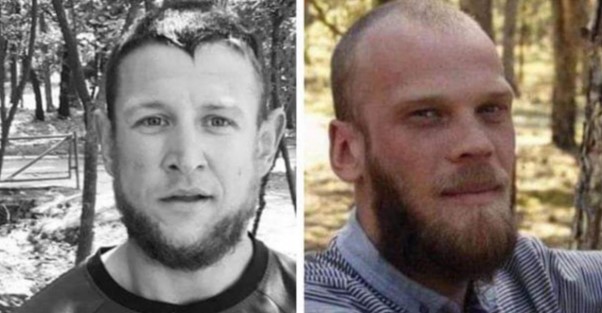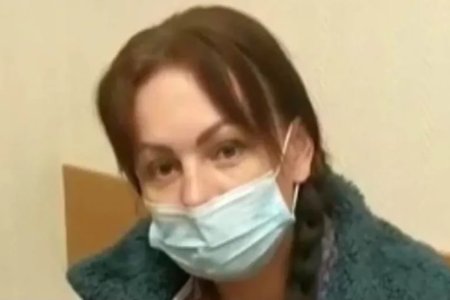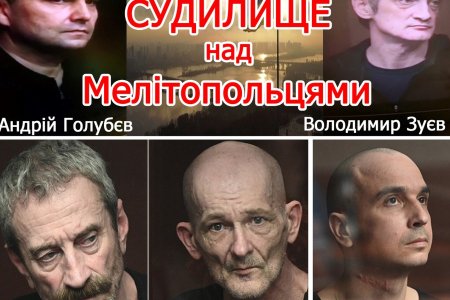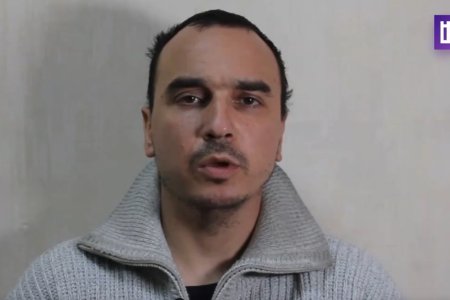
It is 18 months since Yevhen Pryshliak was abducted from occupied Nova Kakhovka (Kherson oblast), and over a year since his parents heard anything from him. A Russian court has just ‘sentenced’ Pryshliak’s friend, Artem Baranov, to ten and a half years’ imprisonment on surreal ‘spying’ charges. Although the two were abducted at the same time, and for some time held together and tortured, Russia is concealing Pryshliak’s whereabouts, although it did once confirm that he had been seized for ‘opposing’ their war of aggression against Ukraine.
The letter that Yevhen’s parents received on 11 January 2023 told him that he was in a prisoner of war camp, that the conditions were fine, that it was warm and they had meals three times a day. There was a television, he wrote, where they watch Russian news and that Nova Kakhovka had been shown a few times. He said that he had been promised he would be released in an exchange, but he didn’t know when this would be. Yevhen may well have wanted to reassure his parents, so that they did not worry, but it is also likely that he was told by his captors exactly what to write. He would have known that, for his family, just receiving a letter in his handwriting would be a huge relief, especially since it was six months then since they had received any information about him.
It is, unfortunately, likely that the only true words in the letter were those about Ukrainian prisoners being exposed to Russian news. All the Ukrainian prisoners of war who have been released in exchanges of prisoners have come home very thin, or even emaciated, and virtually all of them were subjected to torture. It is known that Pryshliak, together with his friend Artem Baranov, were taken in October 2022 to a prisoner of war camp in occupied Sevastopol, however both men are civilians, whom Russia has no right to be holding prisoner and who are, therefore, seldom part of any exchange of prisoners.
According to Yevhen’s sister-in-law, Liubov Pryshliak, the family have not seen Yevehn since 12 August 2022. On that day, he went, with his dog, to the home of his friend, 32-year-old lawyer Artem Baranov. ,
The following day, they learned from a neighbour that both young men had been seized by Russian soldiers. Liubov explains that her father-in-law went to the occupation military command who confirmed only that Yevhen was in their custody. The parents were told that they could bring food and that this would be passed to him. Yevhen was able to get one note to his parents in which he spoke of the appalling conditions in a basement where he was held, together with a lot of civilians and military, including some who were wounded. He wrote that they were forced to sleep either standing or sitting on wooden boards. Liubov mentioned also that men freed from such imprisonment spoke of the hostages having been tortured, including with the use of electric currents.
Yevhen’s parents only learned that he had been taken to a prisoner of war camp in occupied Sevastopol on 19 October 2022 when his father arrived to bring food for him. It was from there that the letter was released, however it is known that he was taken from there to somewhere in Russia on 10 April 2023.
In April 2023, Russia’s defence ministry representatives informed that both Baranov and Pryshliak had been “detained for resisting the special military operation”, Russia’s euphemistic term for its full-scale invasion of Ukraine. They had been taken to Russia and moved there several times.
More information became known in August 2023 when DOXA, an independent Russian publication posted excerpts from letters received from a Russian imprisoned in the SIZO, or pre-trial detention centre, in Rostov-on-Don. This person, called Vasily in the article, had spent time with Artem Baranov who told him about his and Pryshliak’s seizure and torture.
Baranov had told Vasily that the FSB had come for him on 13 August, and that they had since accused him of passing on information “to the Ukrainian side” about the deployment of Russian military units. The invading state was planning to charge a Ukrainian citizen abducted from Ukrainian territory with ‘spying’, under Article 276 of Russia’s criminal code (with this carrying a sentence of up to 20 years).
In May 2023, it was learned that the two men had been seized on 13 August 2022 when around 15 armed Russian soldiers turned up at Baranov’s apartment. They had forced an acquaintance of the two men, Viktor Kushnarenko, to lead them to them and to claim that the latter had directed fire for the Ukrainian Armed Forces. according to the ZMINA Human Rights Centre’s sources, Kushnarenko had, in fact, been seized himself while taken photographs of the results of Russian shelling in Nova Kakhovka, and was doubtless tortured and threatened into making such claims about Baranov and Pryshliak.
Baranov had, he told Vassily, been initially held in the local ‘police’ station with the occupation regime re-opening old cells that Ukraine had not used since 2005 because they did not comply with standards. He said that 12-17 men had been held in a small cell with a toilet bucket and were forced to sleep standing. Vassily only mentions Artem, and it is possible that the latter deliberately avoided mentioning Pryshliak. The families of both men have, however, established that both were sent first to occupied Crimea, and then to three other SIZOs in Russia before Baranov was taken to the Rostov SIZO alone.
Both men were taken to the POW camp in occupied Sevastopol on 19 October where the conditions were better, doubtless because this is a camp for prisoners of war whom Russia may well release in prisoner exchanges. A huge number of civilians whom Russia has abducted have no status, and in very many cases the Russians are not even admitting that it has imprisoned them.
Baranov was taken from occupied Crimea to the Kamyshin SIZO in Volgograd oblast in January 2023. Although Vassily says that Baranov’s ‘case’ was made into separate proceedings at that time, he and Pryshliak were both sent, first to the Kamyshin SIZO, then to the one in Taganrog.
At the Kamyshin SIZO, Baranov told Vasily, a separate floor was set aside for Ukrainian prisoners, with this referred to as a place where they were ‘worked on’. It was standard practice to beat the men with rubber batons or kick them with combat boots while they were kneeling on the ground. The worst, Baranov said, was the ‘sauna’, where the men had to undress, with the Russians then using electric shocks, as well as beating. The men were also forced to learn and to sing the Russian anthem.
Vasily writes in his letter that prisoners have told him about similar ‘premises for working on’ prisoners in several other SIZOs, with that in Ivanovo said to be the absolute worst. He himself heard one occasion when Baranov was clearly savagely beaten and tortured with electric shocks. He writes that he could hear the shouting from the torturers - a mixture of Russian propaganda labels against Ukrainians and foul abuse, with this broken up only by the blows they inflicted on him.
Both families received ‘official confirmation’ in April 2023 that Baranov and Pryshliak had been detained ‘for resisting’ the armed invasion of their country. At the time, ,Pryshliak was described as a ‘witness’ in the illegal spying charges brought against Baranov.
Baranov’s partner, Ilona Slyva, reported on 14 February that he had been sentenced on 8 February 2024 by the Southern District Military Court in Rostov. The latter has been notorious since 2014 for its role in passing politically motivated sentences against Crimean Tatar and other Ukrainian political prisoners, and has, since 2022 been active in the persecution of civilian hostages, abducted by the Russian invaders. The charges against Baranov were, as feared, of ‘spying’ under Article 276 of Russia’s criminal code, with this meaning that Russia held the ‘trial’, which consisted of just two ‘hearings’, behind closed doors. None of the alleged ‘witnesses’ were summoned and questioned in court. Ilona explains that the prosecutor demanded a 13-year sentence. Baranov did, at least, have a lawyer who asked for a considerably lower sentence. Baranov suffers from heart disease and other serious health conditions, with this placing his life in danger in the appalling conditions of Russian penal institutions. The situation is especially tragic as his mother has cancer and fears that she will not live to see her son again.
There remains no information about Yevhen Pryshliak’s whereabouts.



